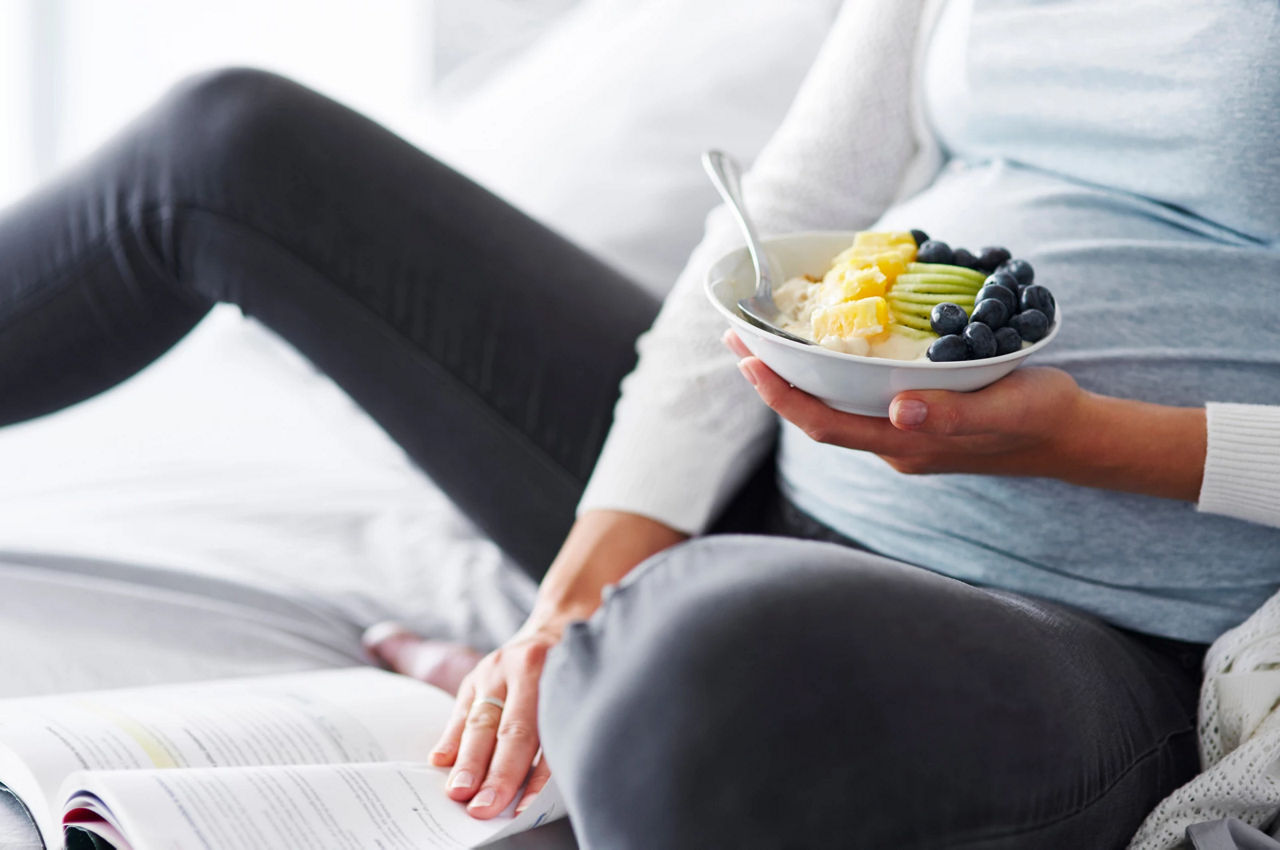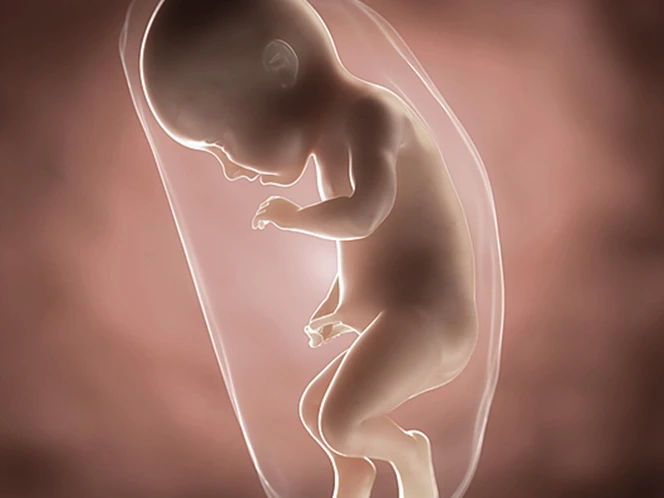By the time you're 34 weeks pregnant, your baby is putting on weight in the form of fat to help them regulate their body temperature and to keep them warm after birth. Their bones are continuing to harden at this stage too. You should continue to eat a wide variety of healthy foods to support you both. Getting into good habits now will make it easier to continue eating the nutrients your baby needs once you start breastfeeding.
34 weeks pregnant

Explore pregnancy stages week by week
Bone structure
By the time you're 34 weeks pregnant, your baby is putting on weight in the form of fat to help them regulate their body temperature and to keep them warm after birth. Their bones are continuing to harden at this stage too. You should continue to eat a wide variety of healthy foods to support you both. Getting into good habits now will make it easier to continue eating the nutrients your baby needs once you start breastfeeding.

Bones continue to harden in week 34
By week 34 of your pregnancy, your growing baby is roughly 5lbs in weight and 31cm long from head to bottom1. Some of this additional weight is from their bones, which are continuing to harden and grow stronger. The exception to this is the bones in your baby’s head: these will stay soft and separated throughout pregnancy so that they can move and adapt safely to the pressure they will experience during birth2.
Many of your baby’s body systems are functioning in week 34 of pregnancy but their immune system is still developing2. It will continue to develop after birth, when your body will support this development, delivering protective factors, such as antibodies, in your breast milk2.
If you were able to take a look inside your womb, you’d be able to see that your baby’s fingernails have now grown to the tips of their fingers. If you’re expecting a boy, their testes may be visible at this stage too, although a small number of boys are born with undescended testes. This usually corrects itself within the first year3.
With your due date drawing closer, now is the time to pack your hospital bag. Thinking ahead to what kind of snacks you might like during labour means you’ll be well prepared when the time comes. It’s worth remembering, too, that only 5% of babies arrive on their due date, so although it is a good guide to when your baby will arrive, it is just that – a guide1.
Your baby’s immune system still has a lot of developing to do – it will continue to mature throughout pregnancy and into childhood.
Establishing healthy habits for breastfeeding
Once your baby is born, your body continues to provide all the nourishment they need through your breast milk. Just as in pregnancy, your body will put your baby’s needs first, so it’s important that your diet includes the right balance of nutrients and energy to support you both.
“The healthy eating habits you’ve hopefully stuck to throughout pregnancy will be equally important once you start breastfeeding.”
Certain nutrients that are considered important during pregnancy are also vital for your baby’s development in their first few months of life, particularly:
- Vitamin D – supports healthy bone development in your baby’s body4. Continuing to take a vitamin D supplement beyond pregnancy will ensure you get the recommended 10mcg each day.
- LCPs, particularly DHA – contributes to the development of your baby’s brain and eyes5. You can get extra DHA by including up to two portions of oily fish in your diet every week.
- Iron – supports your baby’s cognitive development6, both now and beyond birth, and as a key component of red blood cells, is vital for transporting oxygen around the body. Iron-rich foods include meat; oily fish; leafy, green vegetables; and beans.
Another area you’ll need to pay close attention to while breastfeeding is your intake of fluids. The body requires a significant supply of water to produce breast milk and it is recommended that breastfeeding women have an extra 700ml of water daily above the daily recommendation of 2 litres8. That’s 10–11 glasses per day. Don’t forget, though, that tea, coffee, milk, fruit juice, soups and smoothies all count towards this daily amount.
You need plenty of fluids during these last weeks of pregnancy too, so if you have a suspicion you’re not drinking enough water, now is a good time to up your intake and establish a healthy drinking habit.
Next Steps
Oily fish are a powerhouse of beneficial nutrients, including vitamin D, iron and omega3 LCPs. Try these ideas for healthy snacks and light meals that are ideal for your third trimester and while breastfeeding. Just remember to limit your fish intake to two portions per week, due to their potential pollutant content9:
- Sardines on toast with fresh tomatoes
- Mackerel on wholegrain crackers with cucumber sticks
- Fresh tuna steak with new potatoes and green beans
- Grilled salmon, flaked into a green salad and a wholegrain roll
- Poached herring with potato salad and green salad leaves
related articles
Read More

Get in touch with our Careline experts
Our nutritionists and feeding advisors are always on hand to talk about feeding your baby. So if you have a question, just get in touch
- NHS UK. You and your baby at 33-36 weeks pregnant [Online]. 2015. Available at: www.nhs.uk/Conditions/pregnancy-and-baby/pages/pregnancy-weeks-33-34-35-36.aspx [Accessed August 2016].
- Deans A. Your New Pregnancy Bible, The experts’ guide to pregnancy and early parenthood. 4th ed. London: Carroll & Brown Publishers Limited, 2013. p. 46-9.
- Murkoff H, Mazel S. What to Expect When You’re Expecting. 4th ed. London: Simon & Schuster Ltd, 2009. p. 307.
- Commission Regulation (EC) No 983/2009 of 21 October 2009 on the authorisation and refusal of authorisation of certain health claims made on food and referring to the reduction of disease risk and to children’s development and health. OJ L 277, 22.10.2009, pp. 3–12.
- Commission Regulation (EU) No 440/2011 of 6 May 2011 on the authorisation and refusal of authorisation of certain health claims made on foods and referring to children’s development and health. OJ L 119, 7.5.2011, pp. 4–9.
- Commission Regulation (EU) No 957/2010 of 22 October 2010 on the authorisation and refusal of authorisation of certain health claims made on foods and referring to the reduction of disease risk and to children’s development and health. OJ L 279, 23.10.2010, pp. 13–17.
- Commission Regulation (EU) No 432/2012 of 16 May 2012 establishing a list of permitted health claims made on foods, other than those referring to the reduction of disease risk and to children’s development and health. OJ L 136, 25.5.2012, pp. 1–40.
- European Food Safety Authority. Scientific Opinion on Dietary Reference Values for water. EFSA Journal 2010; 8(3):1459 p. 48.
- NHS UK. Foods to avoid in pregnancy [Online]. 2015. Available at: www.nhs.uk/conditions/pregnancy-and-baby/pages/foods-to-avoid-pregnant.aspx [Accessed August 2016].
Last reviewed: 8th August 2016





